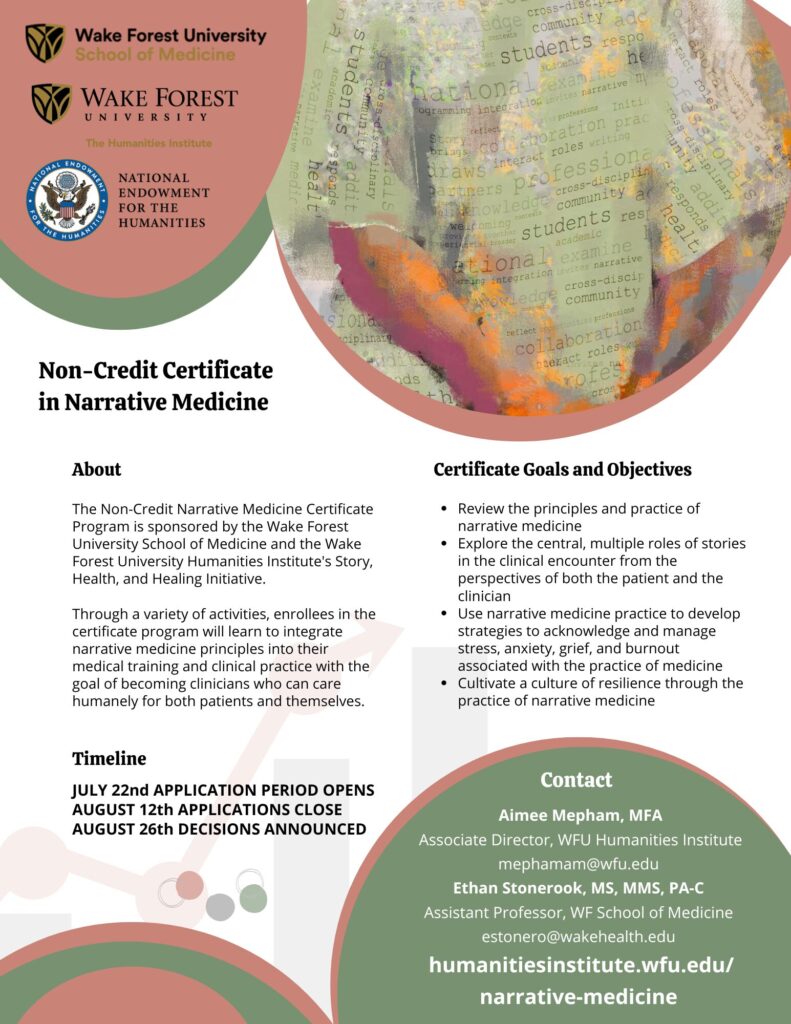Non-credit Narrative Medicine Certificate Program
APPLICATION TIMELINE
JULY 28, 2025: APPLICATION PERIOD OPENS
AUGUST 15, 2025: APPLICATION PERIOD CLOSES
AUGUST 27, 2025: DECISIONS ANNOUNCED
CLICK HERE TO APPLY
ABOUT
The Non-Credit Narrative Medicine Certificate Program is sponsored by the Wake Forest School of Medicine and the Wake Forest University Humanities Institute’s Story, Health, and Healing Initiative.
Through a variety of activities, enrollees in the certificate program will learn to integrate narrative medicine principles into their medical training and clinical practice with the goal of becoming clinicians who can care humanely for both patients and themselves.
This program is open to all students enrolled in degree programs at the Wake Forest School of Medicine.
CERTIFICATE GOALS AND OBJECTIVES
- Review the principles and practice of narrative medicine
- Explore the central, multiple roles of stories in the clinical encounter from the perspectives of both the patient and the clinician
- Use narrative medicine practice to develop strategies to acknowledge and manage stress, anxiety, grief, and burnout associated with the practice of medicine
- Cultivate a culture of resilience through the practice of narrative medicine
PROGRAM REQUIREMENTS
Enrollees will:
- View an online curriculum introducing the history and principles of narrative medicine as well as an introduction to narrative ethics.
• The Principles and Practice of Narrative Medicine: recorded session that will cover the theoretical foundations of narrative medicine along with an introduction to narrative competence, the role of story in the center of the clinical encounter, and the practices of close reading and reflective writing.
• Narrative Medicine in Practice / Parallel Charts: recorded session in which students will be oriented to the phenomenological practice of meaning making amidst difficult clinical scenarios that providers encounter. Students will learn the basic principles of self-care and resilience building through careful reflection and discussion with peers.
• Narrative Ethics: prerecorded session in which students will explore the ethical boundaries of close reading and reflective writing about particular patient scenarios. This session will include exploration of individual bias, patient privacy, and peer accountability in the practice of narrative medicine. - Attend at least 6 Story, Health, and Healing programs/events while enrolled in the certificate program, engage in reflective writing after each program/event (reflective writing may consist of journaling, reflective essays, creative nonfiction, fictional narrative, or poetry), and discuss the program/event and the reflective writing with the primary mentor.
- Attend two annual events:
Welcome Brunch in the Fall
Celebration of Graduates/Project Showcase in the Spring. - Satisfy at least 2 of the following:
• Complete a defined amount of reading from a reading list provided by the certificate program faculty and discuss the readings either with the primary mentor or with other mentors/enrollees at a group meeting
• Attend 2 outside events relevant to narrative medicine and complete the reflection response form (shared with mentor)
• Complete a public reading or performance of creative work made during the certificate program (this may be the capstone project and can be performed during the spring, end-of-year showcase)
• Submit a creative work for publication (this may be the capstone project) - Complete a capstone project, which may be creative or scholarly (project will be designed by the enrollee and primary mentor and then submitted to certificate program faculty for review, comment, and approval)
- Create a written plan for how the enrollee intends to incorporate narrative medicine principles and practice into future clinical or other work
- Attend a minimum of 4 meetings with certificate program mentors while completing items 2 and 3 above
CONTACT
Aimee Mepham, MFA
Associate Director, WFU Humanities Institute
mephamam@wfu.edu
Ethan Stonerook, MS, MMS, PA-C
Assistant Professor, WF School of Medicine
estonero@wakehealth.edu

